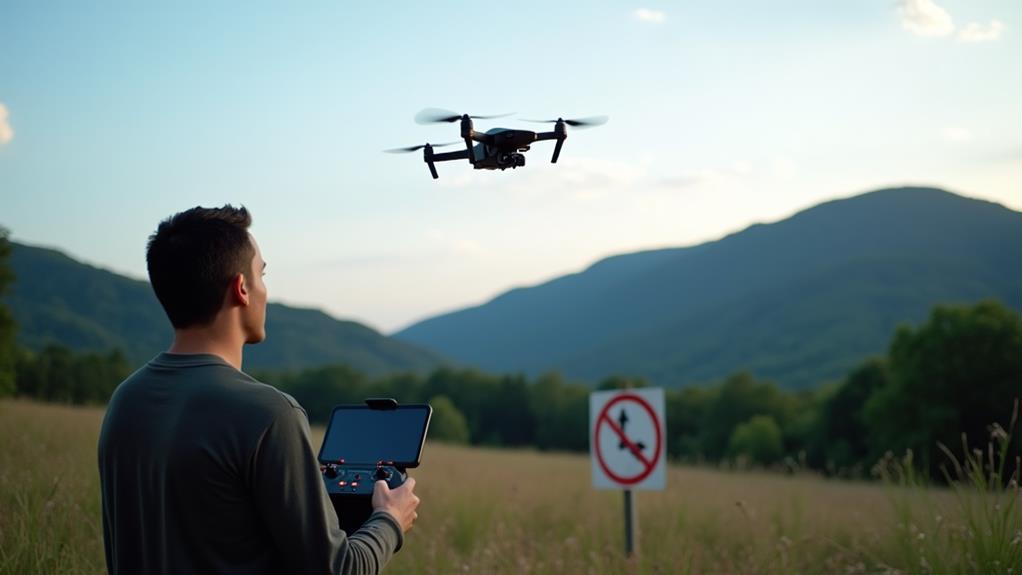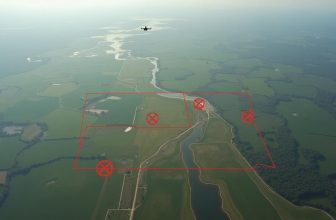
As you prepare to launch your drone into Tennessee's skies, it's essential you understand the state's regulations to avoid costly fines or even having your drone confiscated. If you're a recreational user, you'll need to register your drone and follow specific safety guidelines, while commercial operators face even stricter requirements. But that's just the beginning – there are also restricted areas to navigate, and you'll need to consider the rights of others when flying. What you do next could make all the difference in your drone-flying experience; let's take a closer look at the laws that govern Tennessee's drone use.
Contents
- 1 Key Takeaways
- 2 Recreational Drone Use in Tennessee
- 3 Commercial Drone Operations Laws
- 4 Registration and Permit Requirements
- 5 Restricted Drone Flight Areas
- 6 Drone Safety and Operational Rules
- 7 Frequently Asked Questions
- 7.1 Can Minors Operate Drones in Tennessee Without Adult Supervision?
- 7.2 Are Drone Racing Events Allowed in State Parks?
- 7.3 Can Drones Be Used for Search and Rescue Operations?
- 7.4 Are There Any Specific Insurance Requirements for Drone Owners?
- 7.5 Can Drones Be Used for News Gathering and Journalism Purposes?
- 8 Conclusion
Key Takeaways
- In Tennessee, recreational drones weighing 0.55-55 pounds require registration and a unique registration number label.
- Commercial drone operators need a Part 107 remote pilot certification from the Federal Aviation Administration (FAA).
- Drone registration is required for drones weighing more than 0.55 pounds and less than 55 pounds with the FAA.
- National Parks, military bases, and some airports are restricted areas for drone flights in Tennessee.
- Drone pilots must maintain a visual line of sight and avoid flying higher than 400 feet above ground level.
Recreational Drone Use in Tennessee
When flying for fun in the Volunteer State, you'll need to know the rules governing recreational drone use in Tennessee.
The state's regulations are largely based on the Federal Aviation Administration's (FAA) guidelines. You must register your drone if it weighs between 0.55 and 55 pounds and mark it with the registration number.
To ensure safe and enjoyable airborne photography, follow drone etiquette guidelines.
Always maintain a visual line of sight with your drone, and never fly higher than 400 feet above ground level.
Be aware of your surroundings and avoid flying near airports, national parks, and other restricted areas.
Additionally, respect people's privacy and property when taking aerial photos.
Don't fly over or near sensitive areas, such as prisons, military bases, or areas with high-security restrictions.
Stay at least 25 feet away from people and structures, and never fly over or near emergency response efforts.
Commercial Drone Operations Laws
The majority of commercial drone operations in Tennessee require a Part 107 remote pilot certification from the Federal Aviation Administration (FAA).
As a commercial drone operator, you'll need to pass a knowledge test, be at least 16 years old, and undergo a background check by the Transportation Security Administration (TSA).
You'll also need to register your drone and label it with its unique registration number.
When conducting aerial photography or videography, you must follow the FAA's aerial photography regulations.
This includes obtaining any necessary permits, respecting private property rights, and not flying over people or in restricted airspace.
Consider purchasing drone insurance options to protect yourself and your business in case of accidents or equipment damage.
Additionally, you'll need to maintain records of your flights, including the date, time, location, and any issues that arose during the flight.
You'll also need to ensure that your drone is properly maintained and inspected regularly.
Registration and Permit Requirements
To operate a drone in Tennessee, you'll need to register it with the FAA if it weighs more than 0.55 pounds and less than 55 pounds. This applies to both recreational and commercial drones.
The registration process is straightforward and can be completed online through the FAA's website. You'll need to provide your name, email address, and physical address, as well as pay a small registration fee.
If you plan to use your drone for commercial purposes, you may need to obtain additional permits or certifications.
You'll also need to comply with federal regulations, such as obtaining a Part 107 waiver or exemption. Federal exemptions allow you to operate your drone in certain restricted areas or under specific conditions.
State waivers, on the other hand, are issued by the state of Tennessee and may be required for certain types of drone operations.
It's essential to familiarize yourself with the registration and permit requirements in Tennessee to avoid any fines or penalties.
Make sure to check the FAA's website and the state of Tennessee's website for the most up-to-date information on drone regulations.
Restricted Drone Flight Areas
Flying over certain areas in Tennessee can put you at risk of violating state and federal regulations.
As a drone operator, it's essential to be aware of restricted flight areas to avoid fines and penalties.
In Tennessee, National Parks are off-limits to drone flights.
The Federal Aviation Administration (FAA) prohibits drone flights in these areas to protect sensitive ecosystems and wildlife.
Specifically, Great Smoky Mountains National Park, which spans across Tennessee and North Carolina, has strict drone flight restrictions in place.
Additionally, military bases in Tennessee are also restricted areas.
These bases are protected by the FAA's Temporary Flight Restrictions (TFRs), which prohibit drone flights within a certain radius of the bases.
Examples of restricted military bases in Tennessee include Arnold Air Force Base and McGhee Tyson Air National Guard Base.
Before flying your drone in Tennessee, it's crucial to check the FAA's B4UFLY app or website to ensure you're not planning to fly in a restricted area.
This will help you avoid any potential risks and penalties associated with violating state and federal regulations.
Drone Safety and Operational Rules
Knowing the restricted areas in Tennessee is just the first step in responsible drone operation.
To ensure safe and compliant flights, you'll need to follow the state's drone safety and operational rules. These regulations are designed to prevent accidents and minimize risks to people and property.
When flying a drone in Tennessee, keep the following guidelines in mind:
- Maintain a visual line of sight with your drone at all times.
- Don't fly over people or in populated areas, such as parks or stadiums.
- Respect airspace management by avoiding flights near airports, helipads, and other restricted areas.
- Keep your drone below 400 feet above ground level to minimize conflicts with manned aircraft.
Additionally, it's a good idea to consider drone insurance to protect yourself and others in case of an accident.
By following these rules and taking steps to mitigate risks, you can enjoy safe and responsible drone operation in Tennessee.
Always check for updates to the state's drone regulations and airspace management guidelines to ensure you're flying by the rules.
Frequently Asked Questions
Can Minors Operate Drones in Tennessee Without Adult Supervision?
If you're under 13, you can't operate a drone without adult supervision. You, as a minor, need parental consent to fly, and you must follow flight restrictions, such as avoiding airports and national parks.
Are Drone Racing Events Allowed in State Parks?
"Actions speak louder than words," so you'll need to plan ahead for drone racing events in state parks. You'll face park restrictions, and typically, you'll need event permits to hold drone racing competitions in these areas.
Can Drones Be Used for Search and Rescue Operations?
You can utilize drones for search and rescue operations, providing valuable aid in Emergency Response and Disaster Relief efforts by quickly surveying affected areas, locating survivors, and assessing damage with high-resolution cameras and sensors.
Are There Any Specific Insurance Requirements for Drone Owners?
You'd be crazy to fly a drone without insurance, risking financial ruin from a single crash. You'll typically need liability coverage, often included in commercial policies, to protect yourself from costly damages and lawsuits.
Can Drones Be Used for News Gathering and Journalism Purposes?
You can use drones for news gathering and journalism purposes, engaging in Drone Journalism and Aerial Reporting, by obtaining necessary FAA certifications and adhering to guidelines, regulations, and safety protocols to ensure responsible drone operation.
Conclusion
As you take to the Tennessee skies with your drone, remember to navigate the laws like Icarus avoided the sun – with caution. Registering your drone and keeping it in sight can prevent a crash landing with the law. Whether you're flying for fun or profit, knowing these regulations can help you soar to new heights and avoid a world of trouble. Stay informed and keep your drone flying safely and responsibly.






